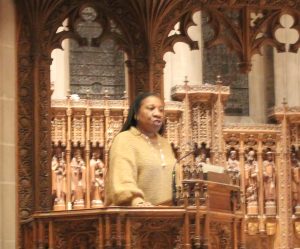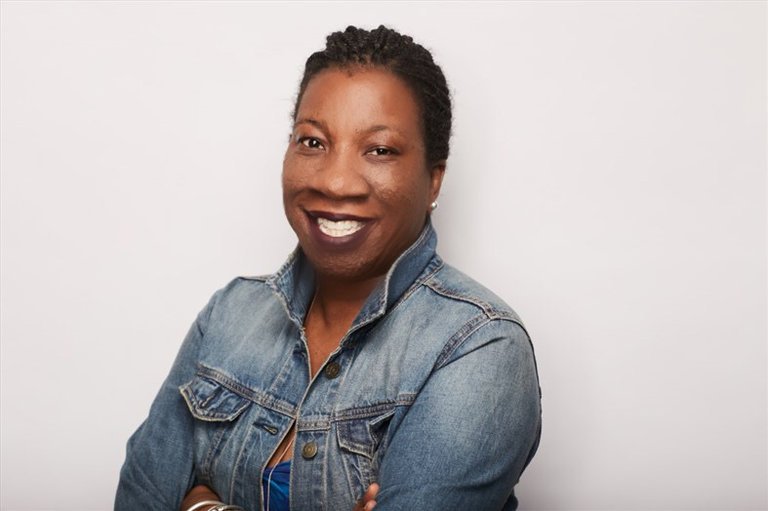Tarana Burke has long been involved social justice work, as an activist and as a founder of several non-profits. She’s also the woman who first launched the #MeToo hashtag – twelve years ago. Recently, Burke spoke at Calvary Episcopal Church in Pittsburgh to a full house of over 1,000 people. She had a story to tell and a message to share about healing and hope.
 After meeting with smaller groups of young women and girls, she spoke to those gathered in the nave of the church. She told the story of Heaven, a girl she met at a youth camp while she was a counselor. Heaven shared an experience with her about the abuse she was facing from her mother’s boyfriend. After listening for several minutes to the girl, she cut her off because she couldn’t take any more of the hurt. Tarana said she will never forget the look on the girl’s face because she could not help her to know that it was not her fault and that she understood because she had also faced abuse. She couldn’t even bring herself to say to the girl, “me too.” Her powerful story helped create “empowerment through empathy.”
After meeting with smaller groups of young women and girls, she spoke to those gathered in the nave of the church. She told the story of Heaven, a girl she met at a youth camp while she was a counselor. Heaven shared an experience with her about the abuse she was facing from her mother’s boyfriend. After listening for several minutes to the girl, she cut her off because she couldn’t take any more of the hurt. Tarana said she will never forget the look on the girl’s face because she could not help her to know that it was not her fault and that she understood because she had also faced abuse. She couldn’t even bring herself to say to the girl, “me too.” Her powerful story helped create “empowerment through empathy.”
Working through her non-profit, Just Be, Inc, Burke has sought to put that “empowerment through empathy” into action. Just Be, Inc works to promote and support the health, well-being and wholeness of young women of color. In the face of media, music and pop culture that increasingly diminish the importance, worth, and esteem of girls and women, particularly women of color, dealing with the range of issues teen and pre-teen girls face daily.
Then last year, that hashtag from 2006, #MeToo,” took off and expanded way beyond anything Burke had imagined or intended. She said she was conflicted about where it was going; “I had to decide, am I going to be in conflict, or in service?” She said she worried the words “me too” would “never hold the same meaning as it’s held all of these years; it would never serve the same people it’s served all these years.”
In a recent article at Huffington Post, author Lauren Sandler wrote of Burke’s words spoken from Calvary’s pulpit. She celebrated that these two words captured something important, but echoing Burke’s words, she worried that a phrase originally intended to comfort were being stretched to serve a wide expanse of needs, perhaps too wide?
“These issues may coexist on the very wide spectrum of the imbalance of sexual (and sexualized) power. But giving them all the same name of a symbol and five compressed letters, is becoming ― to borrow even more of Burke’s language ― an act of conflict, not service.
It’s a thrilling and revolutionary development that we are finally discussing women’s pleasure en masse and challenging assumptions and norms that have existed in our mating rituals. The nuance that has emerged in such conversation is essential. But you know what’s not nuanced? Violent abuse. And to use this hashtag as an umbrella over the myriad emerging conversations about gender and sex and power adds doubt and distraction to a realm that requires an entirely different discourse. It’s far too much work for two tiny syllables to do on their own.”
Calvary partnered with Public Source, a local non-profit engaged in deep journalism with a focus on social justice in the region, to bring Burke to speak. Calvary, as part of a long history of loving and serving its neighbors, partners with more than forty outside groups that regularly share space in the building to work for a more just community.
The pulpit at Calvary, from which Ms. Burke spoke, is the location from which the first church service in the world was broadcast by KDKA radio on January 2, 1921. Many prominent speakers have stood in that pulpit including the Most Rev. Katharine Jefferts Schori, the Most Rev. Michael Curry, and the Most Rev. Desmond Tutu.
Thanks to Jonathon Jensen, Rector of Calvary for his assistance in this article

